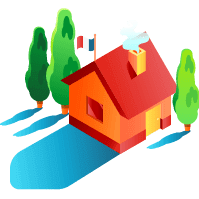How to buy property in France

Want to subscribe to a French energy offer?
Our English-speaking Selectra advisors are here to help you find the right energy plan.
(foreign IBANs accepted) at [email protected]. You can contact us also:

Are you retiring to France? Looking for a fresh start? Moving for a job? Whatever your reason, you'll need a place to live. And you may be considering buying a property in France instead of just renting.
Here’s our guide to buying property in France.
Where to search for French property
Here are two common ways to search for property for sale in France.
Buying French property with an agent

Buying with an agency can be helpful when searching for different types of properties and negotiating with French landlords. It is also more likely that an agent will be able to speak English.
There are two types of realty agents in France. The first is an agent immobilier, or estate agent. These types of agents work locally, and therefore will only have listings in their local area. You may have to shop around for properties in different areas of a city or town. They earn a commission on sales.
The second is a buyer’s agent. These agents can scour a larger range of properties that fit your specifications for price and location. They will charge a fee for their services, which can range from four to ten per cent of the total purchase price.
Here are some agencies to start your search:
Make sure that your agent is part of a registered real estate association such as FNAIM, SNPI or UNPI. This information should be easily accessible in their office or website. Meet your agent in-person in their office if possible to assess the workplace and ensure its legitimacy.
When using an agent, you will likely be asked to sign a bon de visite, which certifies to the vendor that your particular agent showed you a certain property.
Your agent is also legally required to give you a diagnostic report of the property. This report will include things such as any possible hazards in the area such as lead or asbestos, the state of the septic system, any natural disaster risks, and so on.
Sometimes an agent will try to give you a report that is several years older, in order to scam you and sell you the property at the highest price possible.
Buying French property online
Researching your own potential property will save you some money, but it isn’t without its challenges. Take extra care to avoid being scammed.
A common scam is when someone acts as a fake owner. This happens when a scam artist takes a listing from another website and lists it as their own. They will say they’re unable to meet you at the actual property to swap the keys and deposit, and will instead suggest meeting in another place. From there, once you hand over your money, you’ll receive a set of fake keys that you won’t even realize are fake until you try to get into your new place...and fail.
To avoid being scammed, always meet the vendor in person, visit the property in question and never hand over any money until you have a working key and valid property contract.
If you’d rather look for property on your own, here are some websites you can start with:
The French housing market
The property market in France is generally strong, with a small increase of buyers in the last few years. The French themselves tend to rent rather than buy, however, due to the exuberant home prices in major cities such as Paris.
Foreigners are allowed to buy property, but be careful who you buy from.If you’re using a real estate agency, the prices and process of buying should be straightforward. If you’re buying directly from an owner, however, you may be charged a much higher price due to the fact that you aren’t French.
Each region in France has a different landscape and different price point. Here are some common regions to buy a property.
A two-bedroom, two-bathroom house in Paris can start at €750,000, whereas a three-bedroom, four-bathroom place in Brittany can start at €115,000.
A four-bedroom, four-bathroom place in Marseille can start around €1,250,000, but a two-bedroom apartment can start at €295,000.
A two-bedroom house in Lyon can start around €300,000.
Things to consider when buying a house in France
Here’s a small checklist of things you should consider before buying a property in France:
- Do you want to live in the city or the country?
- Is the property detached or semi-detached?
- What is the water system like?
- Is there a proper electrical system?
- What about the septic system?
- Is it close to public transportation?
- Is there parking?
- Is the property facing the sun or away from it?
- Does it have a balcony or terrace?
- Is there an internet/cable connection?
- What condition is the property in?
- Do you need to make any significant changes to make it livable or safe?
Always ask to see the plans of the property and land around it. Make sure there are no plans to build any private or commercial buildings close by.
Buying new vs renovating
If you’re looking to renovate or build a whole new property, you’ll need to get a few documents in order.
You’ll need to reach out to an architect or surveyor to sort out the potential changes to land and property.
You’ll also need permission from your local town hall (mairie) and need to complete a certificate of town planning and urban development (certificat d’urbanisme), as well as other documents to confirm what changes can be made to the property and land.
Sealing the deal for a French property
So you’ve found something you like: congratulations! Now it’s time to get through all the paperwork.
Making an offer
To make an offer (offre d’achat), you must put into writing your interest in the property, the price you’re offering, how the purchase will be set out and your personal information.
Make sure to mention that the offer is subject to the signing of an official compromis de vente, the official contract for the sale. Including this clause makes sure that the offre d’achat is not legally binding until the signing of the secondary document.
The contract (compromis de vente)
Once the offer is agreed upon, the final legally binding contract, or compromis de vente, is written up. It outlines all the details of the property and sale. It is created by a notaire, who is the only person who is legally allowed to process the sale in France.
The agreement will be written up in French and will not always have an English translation.It’s recommended that you find a suitable English translator to look over your contract before signing anything, as there may be legal terms in the contract that are unfamiliar to you.
Finalizing the purchase (acte de vente)
After the contract is signed, both buyer and seller wait a week in case the buyer has changed their mind and can terminate the sale without losing their deposit.
If the buyer has not changed their mind, the deposit is paid (five to ten per cent). The buying process then takes around three months to complete by a notaire.
The final payment is made to the notaire. They, along with the buyer and seller, sign a deed of sale (acte de vente). The notaire will then pay the taxes and register the deed and mortgage.
You will receive the completed certificate of the deed and notice that it has been registered a few months later.
Fees and value-added tax (VAT)
When purchasing a property, there are several types of fees you should be aware of.
Agent fees
If you’re using an agent, the overall price will include the agent’s fees, which will typically range between four to ten per cent of the property price. This will be followed by the letter FAI to confirm that these fees are included.
Always ask for a breakdown of the fees included in the price, and any additional fees that need to be considered.
Notaire fees
These pay for the land/property registration as well as the notaire’s services. These can be around seven per cent of the overall price.
Deposit
You pay your deposit once you sign your contract. This is typically five to ten percent of the purchase price. It is recommended you pay the deposit to the agent or notaire who is arranging your sale and not to the vendor/landlord. They will hold onto the deposit until the sale has gone through.
Value-added tax
VAT is typically an extra 20 per cent fee.
Getting a French mortgage
France has strict rules when it comes to mortgages. Only a third of your monthly income can be used for rent, loans, an existing mortgage, maintenance and credit card payments. The rest of your monthly income can be used for a mortgage and include the cost of life insurance.
All mortgages in France must include a life insurance policy.
If you’re getting a mortgage, you will first need to set aside a mortgage deposit. The amount you will need to provide depends on your nationality, where you pay income tax and the country you live in.
French taxpayers can do 100% of their mortgage, whereas non-French nationals need to put down at least 25 to 30% of the purchase price in a deposit.
It’s recommended that you speak to a professional when taking on a French mortgage. The rules and regulations may be different from mortgages in your home country.
Taxes after purchasing a French property
There are a few taxes you have to be aware of once you own your new property.
Land tax (taxe fonciere)

This will be charged to whoever is occupying the property on January 1. They pay the land tax for the entire year.
Local tax (taxe d’habitation)
This will also be charged to whoever is occupying the property on January 1. If you are renting the property to someone else, they are responsible for the tax if they are living there on that date.
Communal charges (charges de copropriete)
These apply if you have bought an apartment. These include maintenance and service charges and the amount depends on the size and quality of the apartment, as well as any additional services that are offered in the building (i.e. a gym, garden, etc.)